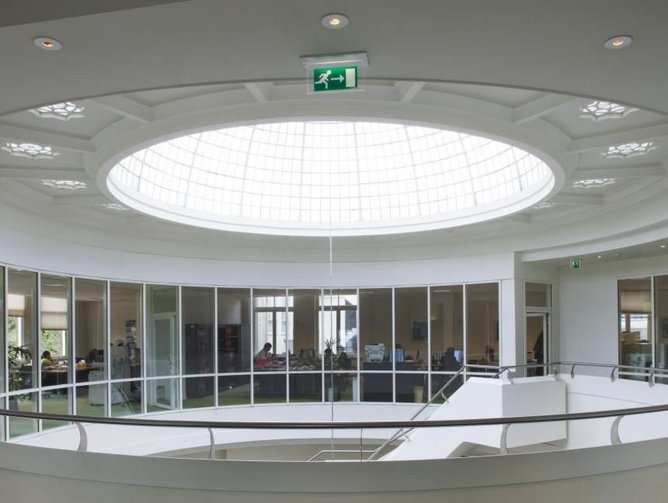How GarantiBank International NV is evolving to become a modern, digital bank
Last year, 85% of banks said that implementing a digital transformation programme was a “business priority” according to the EY Global Banking Outlook. Perhaps nowhere can this be seen better than at GarantiBank International NV. Amid a flurry of digital disruption in the banking space, the Amsterdam-headquartered company has held its own, embarking on a root-and-branch digital transformation strategy.
A subsidiary of Turkiye Garanti Bankasi AS (Garanti), GarantiBank is striving to become a shining example of a modern, digitalised bank. But make no mistake, this isn’t a fleeting initiative. Rather, this is an intensive multi-year project which has seen the company revamp its back-office infrastructure, tap into the power of data, foster innovative ways of working and much more. “When you're embarking on a digital transformation project, it's not something that you can do overnight. It takes multiple years to transform an organisation with the size of GarantiBank,” explains Chief Digital Officer, Alex Hurkmans. “We realised we needed to focus on our IT capabilities first. But ultimately, we had to transform the whole organisation and adopt a more digital way of working.” Through its latest strategy, GarantiBank has worked diligently to focus on where it, as a financial service provider, can add real value. Company leadership quickly realised that overseeing IT infrastructure wasn’t a core activity and could be better managed by an external specialist. Therefore, GarantiBank forged a partnership with Belgium-based company Cegeka. “We wanted to make use of existing services in the market and add our own value on top of that,” observes Hurkmans.
A notable milestone in the company’s digital transformation has been its shift towards a hybrid cloud environment. Cegeka helped the Dutch bank set up this infrastructure, drawing upon the capabilities of Amazon Web Services and Microsoft Azure. “We decided to opt for a cloud-first strategy and we were one of the first banks that were really making full use of the public cloud for bank processes and client databases,” recalls Chief Operating Officer Marco Witteveen, noting how, before that, the organisation ran its very own data centre. “We were spending almost 60-70% of our IT capacity just keeping the lights on and it wasn’t bringing real added value to our customers,” echoes Hurkmans, adding that the company ultimately selected Cegeka to manage its IT infrastructure and act as the company’s cloud integrator. This involved thorough risk assessments and approvals, but now GarantiBank is reaping the rewards of its investment.
With a hybrid cloud strategy now in place, GarantiBank set about its next challenge: reimagining the way its employees are working and teams are collaborating. With Cegeka’s help, it set up a new digital workplace for more than 250 bank employees based on Microsoft Office 365. This has proven to be a hit and has helped the bank meet the demands of its digitally-savvy and remote workers. “When we started, our workspace was still running on our old data centre and people had fixed desks,” remembers Hurkmans. “We asked ourselves: what if we embraced the fast-emerging concept of ‘working anywhere, anytime’?” The Dutch bank adopted a more modern workspace based on Microsoft 365 and implemented remote, portable devices, so that if employees were commuting or not in the office they can still collaborate and share information. “It also fosters a more collaborative way of working,” he adds, noting how the company’s increasingly use of communication tools like MS Teams, “has improved our efficiency enormously and supports our agile way of working”.
GarantiBank’s digital strategy marks a fundamental departure from how the company used to operate. To further bolster this innovative approach, the Dutch company has increasingly championed new processes and methodologies like Lean, Agile and Six Sigma. “To enhance our customer experience, stimulate internal collaboration and ensure that work can be done anywhere and anytime we started to move away from silos towards a holistic approach of end-to-end processes by appointing process owners and digitising underlying end-to-end processes with the support of Outsystem. a low-code platform running in the AWS public cloud that has proven that it can accelerate our digital ambitions” explains Witteveen. “We adopted the bi-modal IT architecture of Gartner where Outsystems is positioned as our system of engagement (fast IT) and our current monolithic core banking system is minimised to just a system of record. We call this ‘caging the animal’ or significantly reducing the dependency on legacy,” Witteveen continues.
In fact, over the past two years, Hurkmans underlines how the company has “run more than hundred sprints and already delivered lots of functionality for the whole client lifecycle management.” Hurkmans also points out how GarantiBank recently reorganised its IT department and adopted a DevOps approach, whereby it focused less on infrastructure and more on value-adding projects. “Before I joined, we did one or two IT projects per year on average,” Witteveen recalls. “In the last two and a half years, we now do around 18 to 20 projects each year and they're also bigger and more complex. We’ve achieved this just by adopting DevOps and an agile way of working” As the speed of innovation continues at its blistering pace, Hurkmans points out how this has helped to promote a sense of continuous improvement too. “With the appointment of process owners and close alignment with scrum masters, IT and business colleagues are closer together working for only real clients . We can also adjust during the sprint, which ensures we’re always innovating and adapting in a never-ending loop,” he explains.
Garanti Bank’s digital strategy is in full swing and shows no signs of slowing down. Looking forward, the Dutch bank is readying itself to launch a corporate internet platform and Hurkmans also highlights how the standardiation of end-to-end processes is helping GarantiBank to prepare for the rise of Open Banking. “In the coming years, we need to have infrastructure that supports Open Banking so that we can quickly use all the new technologies and market platforms that will be developed in the years to come,” he says. “It emphasises the necessity of being open and data-driven with standardised processes. You should be able to link yourself to other players in the market. Don't see them as competitors but rather see them as being part of an ecosystem. If we can do that successfully, I think we’ll do a great job.” Elsewhere, Witteveen points out how senior management will continue to steer the direction of the company by creating multi-disciplinary teams and giving clear guidance. “We are looking for a completely different skillset and we’ve decided to invest heavily in the people that are already working at GarantiBank International N.V.,” he adds. Regardless of the initiative though, it’s apparent that GarantiBank is in the midst of great change which will redefine the business for years to come. Indeed, as Hurkmans affirms: “Digital transformation isn’t just about IT, it's a transformation of the entire organisation.”





